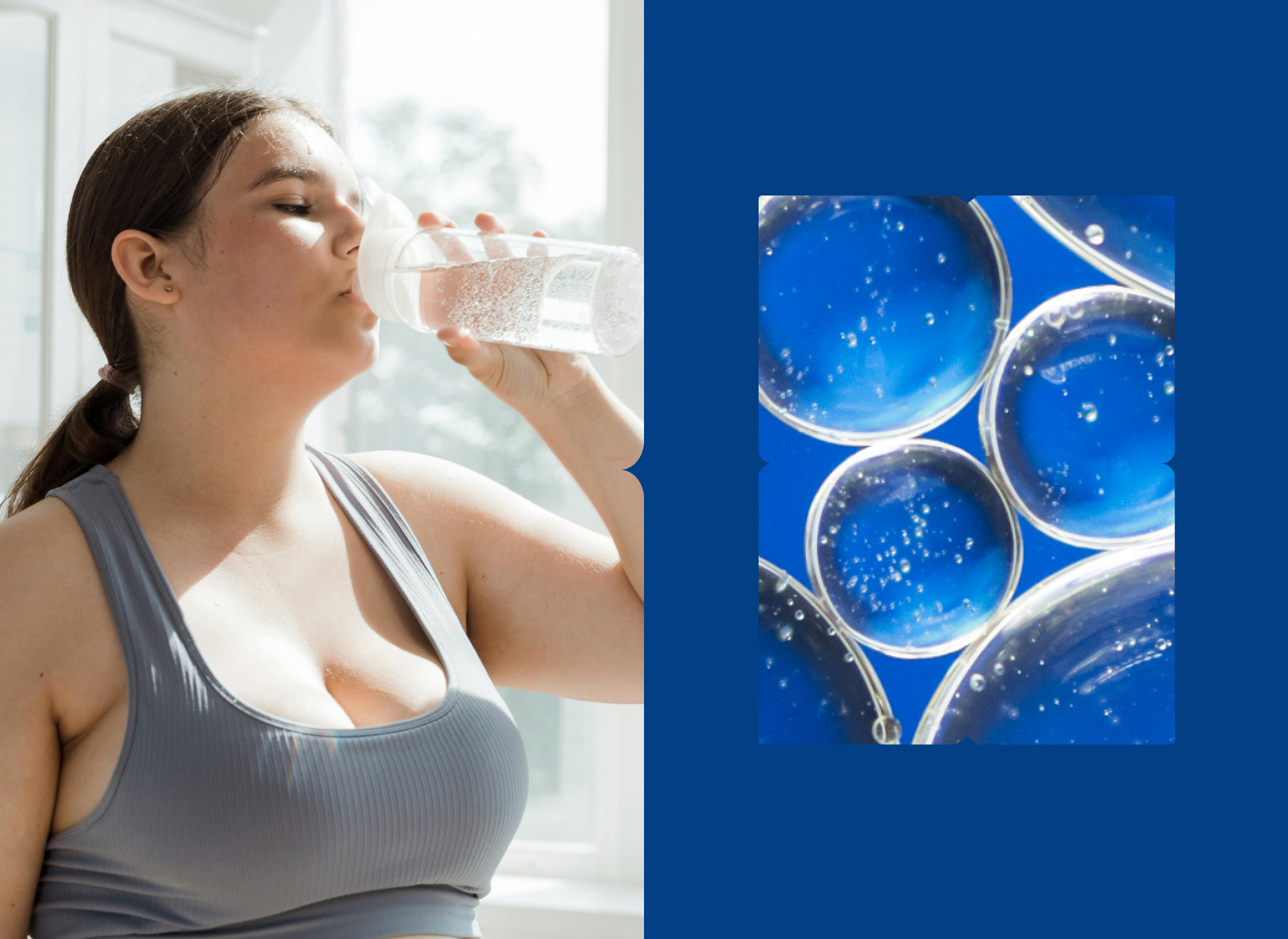Why Measuring Hydration is Important?
Testing hydration levels is crucial for several reasons, particularly in ensuring overall health, optimizing physical performance, and preventing dehydration-related health issues. The importance of measuring and maintaining optimum hydration includes:
- Supports Cellular Function: Every cell in the body needs water to function correctly. Water is vital for cellular homeostasis and biochemical reactions. Both poor hydration and over-hydration can adversely impact cellular functions, organ health, and the entire body.
- Enhances Physical Performance: For athletes and those engaged in physical activities, optimal hydration is crucial for peak performance. Both dehydration and overhydration can compromise athletic performance during exercise and competitive sports. Dehydration can reduce strength, focus, and increase the risk of injury, as well as escalate cardiovascular stress during intense exercise. Conversely, over-hydration due to excessive intake of fluids can increase the risk of bloating, gastrointestinal discomfort, and body mass gain – all undesirable traits during sports or any physical activity.
- Promotes Mental Clarity and Cognitive Function: Hydration status significantly impacts cognitive function, concentration, and mood. Even mild dehydration can affect cognitive abilities, impair attention, judgment, and memory. Scientific evidence suggests that both under and over-hydration can dull the ability to perceive and interpret sensory information.
- Assists in Metabolism, Weight Management, and Digestive Health: Adequate hydration is vital for digestion, promoting satiety, nutrient absorption, supporting gut health, and preventing digestive issues like constipation, gastritis, ulcers, and acid reflux.
- Supports Kidney Function: Proper hydration is crucial for kidney/renal health for the effective removal of waste, toxins, and excess substances from the body. Staying well-hydrated helps in maintaining a healthy glomerular filtration rate (GFR), a measure of how well the kidneys are filtering blood. Dehydration can reduce GFR, indicating impaired kidney function. Chronic dehydration can lead to higher concentrations of calcium and other minerals in the urine, which can precipitate and form kidney stones. Optimal hydration helps prevent kidney stones by increasing urine flow and diluting substances in the urine. Adequate fluid intake also helps prevent UTIs by flushing bacteria from the urinary tract.
- Helps Toxin Elimination: Optimal hydration supports the body's natural detoxification systems, including the kidneys, liver, digestive system, lymphatic system, and skin. It aids in eliminating toxins and waste products through urine, feces, and sweat and is essential for overall health and efficient bodily functions.
- Ensures Nutrient Transport: Blood, composed of approximately 90% water, plays a vital role in transporting oxygen and various nutrients (such as glucose and amino acids) to cells and in removing waste products like carbon dioxide. Adequate hydration maintains proper blood volume for efficient circulation, ensuring effective nutrient transportation and absorption, and supporting the health of vital organs and tissues.
- Provides Thermoregulation: Optimal hydration is essential for effective thermoregulation. It enables adequate sweat production, maintains blood volume for heat dissipation, prevents heat stress conditions, supports cardiovascular function, and contributes to overall body temperature stabilization. This is particularly important in hot environments and during physical activities that increase body heat [3].
- Prevents Overhydration. Overhydration or hyponatremia can be just as dangerous as dehydration. Excessive water intake can put you at risk of water intoxication or hyponatremia, where sodium levels diminish, causing swelling in organs and tissues.
.webp)
Who should test hydration levels?
Testing hydration levels for wellness monitoring is beneficial for various groups of people, each with specific needs or circumstances that make monitoring their hydration status particularly important:
- Athletes and physically active individuals.
- People with certain health conditions, such as UTIs, diabetes, heart, and kidney diseases.
- Older adults.
- People working in hot climates.
- Individuals trying to manage weight.
- Patients in clinical settings, especially those with fluid restrictions or receiving diuretic therapy.
- Pregnant and breastfeeding women.
- People with a history of hyponatremia.
- Individuals engaged in high-altitude activities.
In general, while everyone should be mindful of their hydration, these specific groups may need to pay extra attention due to their increased risk of either dehydration or overhydration.
How Often Should I Measure My Hydration Levels?
Body hydration levels are dynamic, meaning they fluctuate throughout the day. For instance, first-morning urine is generally more concentrated, typically resulting in a higher USG value. Factors like fluid intake, diet, climate, hormonal (circadian) rhythms, and activity levels significantly influence your body's hydration status.
A spot urine test provides a snapshot of your hydration status at a specific moment. For a comprehensive hydration profile, it's advisable to monitor USG multiple times throughout the day. Relying on a single data point for a conclusive assessment can be misleading.
For clinical evaluation using USG measurements, it is recommended to check urine specific gravity on a 24-hour urine sample for a more accurate and comprehensive analysis.

Summary
All physiological systems in the human body are influenced by our hydration level. Optimal hydration is essential for maintaining body temperature, lubricating joints, and enabling the transportation of nutrients and oxygen to cells. It supports metabolic functions, aids in digestion, and facilitates the removal of waste and toxins. Moreover, staying well-hydrated is critical for cognitive functions, affecting mood, concentration, and memory; it is also fundamental for muscular endurance and overall physical performance. Scientific studies show that dehydration can impair aerobic capacity, muscle endurance, and mental performance. It also elevates the likelihood of suffering from heat exhaustion and heat stroke. Chronically atypical USG is linked to several serious medical conditions, including diabetes insipidus, hypertension, and renal stenosis, among others.







.jpg)







